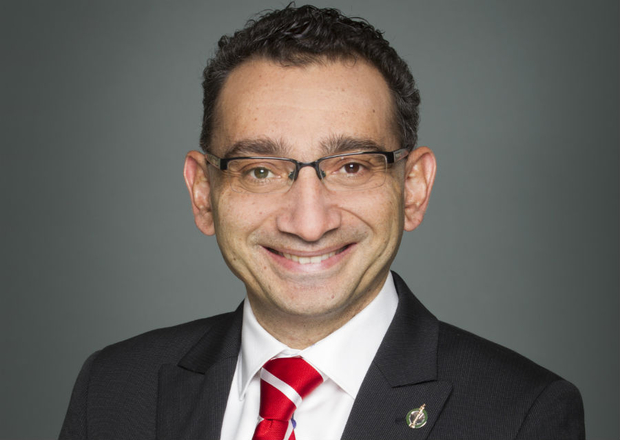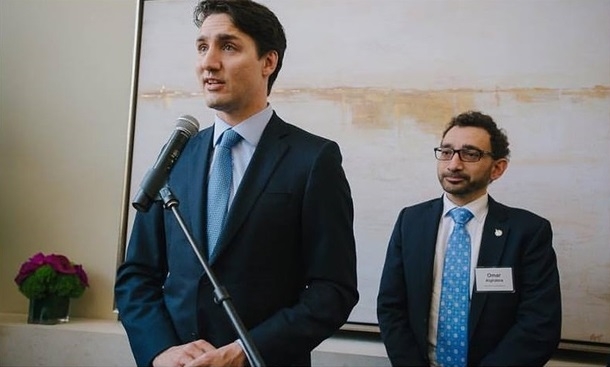Like this article? rabble is reader-supported journalism. Chip in to keep stories like these coming.
Omar Alghabra has been called many things; a trusty adviser to the Canadian prime minister, a closet Islamist, and “Political Man” — a cartoon superhero in a suit.
Born to Syrian parents but raised in Saudi Arabia, Alghabra moved to Canada when he was 19 to study mechanical engineering. He says he never thought about politics much in his youth, or his student days when he made ends meet by working in a doughnut shop, a gas station and a convenience store. But his background has since helped to win him a key position at Prime Minister Justin Trudeau’s side and secured him win a strong following amongst Toronto’s diverse constituents.
Alghabra was elected to the Canadian Parliament as a Liberal Party MP twice, first in 2006 when he served for two years and then again in 2015. His constituency, Mississauga Centre, is a large electoral district neighbouring Toronto where more than 50 percent of residents are from minority communities, mostly South Asian.
Since breaking into politics, the 46-year-old has made his mark by campaigning passionately on human rights issues and balancing civil liberties with security laws, while also strongly lobbying for immigration reform. It is in foreign policy, however, that Alghabra is clearly making waves.
As a long-time personal friend of Trudeau, Alghabra has long been a familiar face in Ottawa’s political circles and following Trudeau’s victory in federal elections last October, he was appointed to serve as parliamentary secretary to Foreign Minister Stephane Dion. His role is to liaise between the minister and parliament and to answer questions and table reports when ministers are not in the House of Commons.
Fighting criticism of biggest-ever arms deal with Saudi Arabia
Alghabra’s boss has found himself embroiled in controversy surround the sale of military equipment to Saudi Arabia and other rich Arab states. In recent months, sales have soared and Canada is now the world’s second-biggest arms dealer in the region, behind only the U.S.
According to the new findings by IHS Jane’s, a defence industry publisher that tracks military spending, Canada’s rise from sixth to the second place comes on the heels of Canada’s $15 billion sale of combat vehicles to Riyadh early this year. The sale was Canada’s largest ever arms deal and went ahead despite the kingdom’s extremely poor human rights record and its leadership of the deadly anti-Houthi campaign in Yemen that began last year.
Human rights groups, Liberal Party politicians and even some key players inside the foreign minister’s own ranks, have spoken out against the deal.
Weeks before joining the Global Affairs office, the new name for the Canadian Foreign Office, Jocelyn Coulon, an academic and former journalist, published a column in a Quebec newspaper arguing that Saudi Arabia effectively mutes Canadian criticism by buying its silence with large arms deals.
He argued that “Saudi Arabia has bought the silence of Westerners with its juicy civilian and military contracts” which were dished out despite the Saudi army “barely know[ing] how to use them, as can be seen in Yemen and against Islamic State militants.”
But Dion, with Alghabra’s backing, has fought off the criticism. He insists that the contract will not be cancelled and that growing ties with the kingdom would give Canadian politicians more scope with which to raise concerns privately.
When a Canadian delegation visited Riyadh last month as part of a Canada-Gulf Cooperation Council meeting, Alghabra was there front and centre of the debate.
“Look — Saudi Arabia is a sovereign country and as representatives of the Canadian government we have to deal with the Saudi government in a candid, comprehensive way,” he told Middle East Eye shortly after the visit in late May.
“So this was a great opportunity for us to meet with senior officials as high as the king and independent individuals of organisations to discuss the issues that Canadians expect us to talk about.”
Alghabra says the experience of meeting the king was “very surreal,” but that he feels that there is definitely room for cooperation.
“When I met the king, I let him know that I was born in Saudi,” he said. “He was very warm and hospitable. I said to my colleagues at the time that I never would have imagined one day I would come back and meet the king as a representative of the Canadian government.”

While it was difficult to meet independent human rights organisations in a state notorious for imprisoning poets and bloggers, Alghabra stresses that he strove to meet with as many people as possible.
“Did we meet with everyone in the 30-hour visit? Probably not. Did we put an effort into meeting non-officials and individuals representative of civil society? We did,” he said.
National Commission for Human Rights, a government agency that reports directly to the Royal Court — and is considered among prominent Saudi activists as inept – was high on the meeting agenda.
“We knew it was a Saudi government agency, but we thought it would be important to learn from them about the work they were doing, and frankly to share with them some of the ideas we could bring to the table,” Alghabra says.
Women in the kingdom
Women’s rights is an area where Alghabra says he feels “real change” is coming.
“There’s no doubt there are a lot of challenges that women are facing, but I also saw a lot of determined, confident women who are picking up the mantle and really pushing for changes and reforms,” he says.
During his visit, Alghabra said he met with two women who were elected to municipal councils last December in the country’s first ever local elections that include female voters as well as candidates.
“One had quit [the municipal council since the election] and one had decided to stay on. It was interesting to speak to both of them and see the choices they made… to hear about the process to get them elected and the various challenges,” he said.
The very unique concerns, according to Alghabra, were well voiced by a roundtable him and the foreign minister held with Saudi women.
“One woman said to myself and the minister: ‘You know we come to this meeting conflicted. On the one hand, we want to share the challenges and experiences we are facing. On the other, we don’t want a western country like Canada to misconstrue what we’re working on and feel they need to impose or demand things,” he said.
“We want you to know we’re working very hard internally, domestically, and the best way to do these things is organically. So we were reluctant to do this because we don’t want others from the outside to come and tell us how to do things.’ I thought that was so interesting and fascinating,” he added.
‘Closet Islamist’
The irony of representing a party that is often seen as progressive and liberal while having grown up under autocratic rule does not escape Alghabra.
He says it felt “special” to come back to Saudi Arabia and that the trip “brought back many, many memories” and reminded him “of the heat”. But life is very different now.
“I grew up in a country where politics is really exclusive to the elite; there is no such thing as democracy or civil participation,” he said in an interview in 2010.
“I believed that politics were self-interested, and politicians were not really here to help university students and [were] just promoting their own agendas.
“So I would just stay away from anything to do with politics or partisanship. It was later on in life that I started thinking about the meaning of life — as human beings, we tend to complain about things and want to see things improved. I realized that if people don’t offer their own ideas, things won’t change. And that’s when I jumped into politics.”
But while Alghabra insists his background allows him to have a “unique” perspective and act as a useful bridge between Canada and the Gulf, he has also found himself targeted for his ethnic background and pro-Palestine views.
His fiercest critics have primarily come from the right-wing Toronto Sun newspaper and other publications. Last year, Canadian Jewish Press ran a lengthy story reviving allegations of his so-called Islamist agenda.
The “allegations” refer to a reported incident in 2006 when an Alghabra supporter allegedly yelled that his election was “a victory for Islam! Islam won! Islam won!… Islamic power is extending into Canadian politics.”
The story sparked an outcry among neo-conservative pundits in Canada and the U.S., including historian and political commentator Daniel Pipes who claimed the incident highlighted Alghabra’s support for an “Islamist agenda”. He cited Alghabra’s failure to condemn Palestinian suicide bombers in an interview with the Jewish Tribune, and once criticising Toronto’s police chief for taking part in a charity walk for Israel.
Alghabra, however, says he was unfazed by the coverage and flatly denies links to Islamist groups or allegations of anti-Semitism.
“Have I ever faced prejudice or discrimination doing this job? I can unequivocally say no,” he says. “Did I ever face or did I face some negative comments based on negative stereotypes or prejudice from social media? Yes, but they are rare in occurrence. Do they represent large groups of Canadians? No.”
To him the answer is simple. More must be done to promote Canada’s perspective and values.
“Canada is a country that is inclusive, tries to treat people with equality, acceptance and is accepting of its diversity,” he says.
But the relationship must go both ways.
“I’m not saying we live in this utopia which is lovey-dovey and everything is great. The best way to deal with these difficulties is by really engaging and confronting them. Sitting back and complaining about things is not going to bring about a positive outcome,” says Alghabra.
“Choosing to engage – as difficult as that may be — sometimes puts us in a position with people and situations that we really don’t agree with. But it’s much more useful to do that than sitting on the sidelines.”
This article originally appeared in Middle East Eye.
Like this article? rabble is reader-supported journalism. Chip in to keep stories like these coming.




